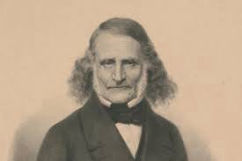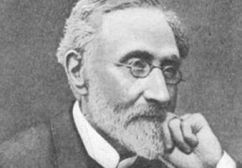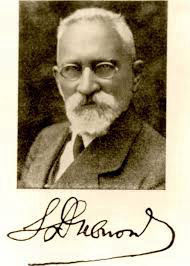Arts & Culture
Zunz to Graetz to Dubnow

Leopold Zunz
At the turn of the 20th century, the Chicago Cubs were known for the ability of their “Keystone Combination”, short stop Joe Tinker to second baseman Johnny Evers to first baseman Frank Chance, to turn a double play. They were even eulogized in a poem, That Double Play Again.
Zunz to Graetz to Dubnow constitutes the Keystone Combination of Jewish History, Zunz, in his initiation of Wissenshaft des Judentums, (the scientific study of Judaism) to Graetz in his Popular History of the Jews to Dubnow’s History of the Jews of Russia and Poland.
At the beginning of the 19th century, Jewish ghettoization was altered by Napoleonic emancipation, which allowed integration, including access to University education, for many. It was not easy, though, for educated Jews to earn a livelihood. Many converted. Leopold Zunz, who received a University education in Berlin, remained a steadfast and academically active Jew for his 92 years. He was born in 1794 in Detmolt Germany, his father a Talmudic scholar, his mother the daughter of a Hazzan. A strict Jewish education was initiated at age four. His father died when Zunz was 8 years old, and his Jewish education was continued when he was sent to the Jewish "Free School". He would never see his mother again. She died in 1809. A turning point in Zunz's education came in 1807, when Samuel Meyer Ehrenberg, a reform-minded educator, took over the directorship of the School. Ehrenberg reorganized the curriculum, introducing alongside traditional Jewish learning a number of new subjects such as history, geography, French, and German. He became Zunz's mentor, and they remained lifelong friends. Zunz continued his education at the University of Berlin where he was active in the Verein für Kultur und Wissenschaft der Juden (The Society for the Culture and Science of the Jews, described in a previous TNJT publication). He edited and submitted articles to a seminar series that published scholarly articles named Institute Fur die Wissenshaft des Judentums. Subsequently he obtained a doctorate from the University of Halle. He was ordained by Rabbi Aaron Chorlin, an early supporter of religious reform. Zunz served at the Reformed Synagogue in Berlin, teaching and giving sermons. Although he was a champion of Jewish rights, advancing the cause of liberalism, Zunz showed little sympathy for radical reform, leaving the Reform Synagogue after two years. He served as Director of Lehrerseminar from 1840 to 1850,
Leopold Zunz, throughout his long career, wrote meticulous studies and gave impassioned speeches on Jewish history that had a lasting influence on later Jewish historians. He fought for Judaism on many fronts including the quest for critical sources, the exacting study of those sources, and the need for contextual and comparative analysis rather than midrash.
In Zunz’s 1817 publication Etwas Uber die Rabbinische Literature, the 23 year-old lamented the degradation of Judaism in the Christian literature. “Rarely has the world been presented with more damaging, erroneous, and distorted views than on the subject of the Jewish religion.” He continued: “We must sensibly approach the study of a people and its history, both political and spiritual. But this is precisely what creates the greatest obstacle, that the matter of the Jews is handled like its literature. People tackle both with biased passion, assessing them either too low or too high.” Here, Zunz is calling for an unbiased history of the Jewish people.


Heinrich Graetz
Subsequently, histories were written by his childhood friend Isaak Jost and by the Reform leader Abraham Geiger, but Zunz felt that these were inaccurate and actually detrimental to Judaism.
When Heinrich Graetz proposed writing a history in the mid-1840s, Zunz was skeptical, yet Graetz proceeded with his plan and would profoundly influence subsequent generations with his work.
Graetz was born to an uneducated family in 1817 in Posen Prussia, relocating to Wollstein in 1831. He attended the Zerkow Yeshiva, where he received a religious education without a secular component. His secular knowledge and linguistic competence were totally self-acquired. As a teenager, he was impressed by the writing of Samson Raphael Hirsch, and at Hirsch’s invitation lived with him from 1837 to 1840 as his pupil. In October 1842 he entered the University of Breslau. Graetz, true to the principles of Hirsch, began his literary career criticizing the Reform movement. Antipathy toward the Reform movement and its degradation of Jewish history became a hallmark of Graetz’s career. In due course, he became disenchanted with the orthodox positions of Hirsch, moving into the Conservative camp. Graetz obtained his Ph.D. from the University of Jena in 1845. He served in a variety of capacities before taking a position in Frankel’s Breslau Seminary in 1854, where he remained for the rest of his life, teaching history and Biblical exegesis, with a preparatory course on the Talmud. Graetz worked on his Popular History of the Jews from 1853 to 1876. In 1869 the government conferred upon him the title of Professor.
Graetz had his detractors and advocates. He was aggressively attacked by the anti-Semitic German nationalist Treitschke and as a result was not invited to join the commission created by the Union of German Jewish Congregations for the promotion of the study of the history of the Jews of Germany in 1885. Nevertheless his fame spread abroad, and he was invited to lecture at the Anglo-Jewish Exhibition in 1887. A volume of scientific essays was published in his honor on his 70th birthday, and in 1888 he was appointed an honorary member of the Spanish Academy. In 1891 he died of heart disease, and he was buried in Breslau.
Simon Dubnow, a self-educated Russian Jew, had been impressed by the Wissenshaft des Judentums movement and the writing of Heinrich Graetz at a young age. On hearing of Graetz’s death, he dedicated himself to continuing Graetz’s work, producing a Jewish history that focused on Russia and Poland.
Dubnow was born into a poor family in Belarus. He received a traditional Jewish education in a heder speaking Yiddish and Hebrew, and then a State Jewish school where he first learned Russian. In the midst of his education, the State Jewish schools were closed and Dubnow was unable to graduate. He persevered, though, pursuing his interests in history, philosophy, and linguistics. In 1880 he used forged documents to move to St Petersburg, officially off-limits to Jews, where he initiated his writing career, publishing in the in the Russian–Jewish magazine Voskhod. In 1890, when the Jewish population was expelled from St. Petersburg, Dubnow settled in Odessa and continued to publish studies of Jewish life and history. Later, while living in Vilna, Lithuania he became active in organizing a Jewish political response to the 1905 revolution.

Simon Dubnow
In 1906 he returned to St Petersburg, where he founded the Jewish Literature and Historical-Ethnographic Society, edited the Jewish Encyclopedia, and took part in the Jewish People's Party. In 1916, he published the first volume of his book,The History of the Jews in Poland and Russia.In 1917 Dubnow became a Professor of Jewish history at Petrograd University. In 1922 he emigrated to Lithuania, and later to Berlin. From 1923 to 1929 he published a the ten-volume World History of the Jewish People, which traced the history of the Jews from their beginnings to modern times. Historian Koppel Pinson remarked that with this work, Dubnow assumed the mantle of Jewish national historian from Graetz, with what he regarded as the first secular and purely scholarly synthesis of the entire course of Jewish history, free from dogmatic and theological trappings.
In August 1933, after Hitler came to power, Dubnow moved to Riga, Latvia, where he wrote his autobiography, Book of My Life. In July 1941, Nazi troops occupied Riga. Dubnow, together with thousands of Jews, was transferred to the Riga ghetto. According to survivors, Dubnow repeated to ghetto inhabitants: Yidn, shraybt un farshraybt (Yiddish: Jews, write and record!). Dubnow died on December 8, 1941. Several friends buried him in the old cemetery of the Riga Ghetto.
Throughout his life, Simon Dubnow was deeply concerned about the future of his people. He stressed the historic period of Jewish autonomy in Poland and Lithuania in the 16th century, which fostered a spirit of discipline and obedience to Judaism as well as to the political authorities. As the Polish-Lithuanian Commonwealth was absorbed by adjacent countries, autonomy was lost. During his life, Dubnow unsuccessfully worked to restore Jewish autonomy.
In conclusion, we may ask how the 1982 Cardinal Keystone combination of Ozzie Smith to Tommy Herr to Keith Hernandez compares to Tinker to Evers to Chance? The former had better training facilities and better equipment, and they played on better infields. Similarly, historiography has changed. We have easier access to a larger database, and more refined analytical techniques to evaluate those sources. Nevertheless, we must honor those historians who set the standards to which we aspire.
Graetz,s Popular History of the Jews comprises six volumes:
1: From the formation of the nation to the death of Antigonus the Asmonean
2: From the reign of Herod I (37-4 B.C.E.) To the death of Mohammed
3: From the coming of the Jews under the domination of Islam (640 C.E.) to their first expulsion from France
4: From the first expulsion of the Jews from France (1306 C.E.) to the settlement of Don Joseph Nassi in Turkey
5: From the reign of Stephen Bathory of Poland (1575-1586 C.E.) to the present time
6: A history of the Jews in modern times (1848-1918)
By Ralph Graff